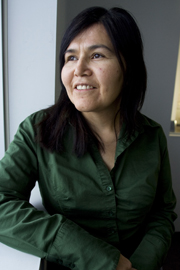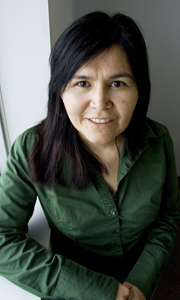UNBC Student Investigates Sleep Disorder in First Nations Communities
February 4, 2009
|
A UNBC Nursing student in Terrace has worked to provide researchers with valuable field data about rates of sleep disorder and depression in aboriginal communities. The results confirm that sleep related disorders are more common among indigenous than non-aboriginal populations.
Mary-Ann Speirs, a third year student of the Northern Collaborative Baccalaureate Nursing Program, went door-to-door through Kitsumkalum, Kispiox, Gitanmaax, Gitsegukla, Kitwanga, and Gitanyow, surveying residents as part of a recently published study in the Journal of Clinical Sleep Medicine led by the UBC Sleep Disorders Program in Vancouver. "I loved visiting people in their home and discussing their hardships, concerns, and cares," says Speirs who is Gitxsan and grew up in Gitsegukla. "It reaffirmed for me what I have been working towards." Speirs felt that being a local research assistant would open doors and get access that would be otherwise unavailable. "Mary-Ann did the majority of the work and surveyed all the First Nations villages from Terrace to Kispiox,” says project leader and UBC psychiatrist Colleen Froese. “Without her diligence and perseverance the study may not have been possible." Sleep disorders are associated with increased daytime impairment, fatigue-related accidents, and a decrease in the quality or enjoyment of life. There is a strong association with physical and mental illness and suicide. "In Northern BC, there are two very important considerations – motor vehicle crashes and suicide rates," adds Dr. Froese. "Excessive daytime sleepiness is considered as dangerous as intoxication, yet it has received little attention and there is already a high risk of suicide in First Nations, with rates five to six times higher than the non-aboriginal population." Dr. Froese says sleep disorders and depression often go undiagnosed or untreated in First Nations people, but there are known effective and reliable methods of diagnosis and treatment available. "Improved access to sleep disorder diagnostic and therapeutic services would be a start," says Dr. Froese, adding, "Educating people like Mary-Ann is extremely important as they will go back and educate people in their communities." Contact: Rob van Adrichem, Director of Media and Public Relations, UNBC - 250.960.5622 |
Media Downloads
Click
on a thumbnail below to access a high-resolution image of UNBC Nursing student Mary-Ann Speirs.
|


